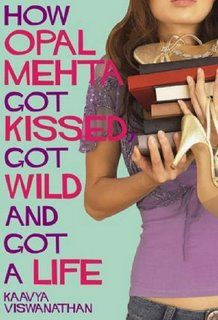WHEN YOU KISS, DON'T TELL

From the time I heard of the massive US $500,000 advance given by Little Brown to a yet to be published 17 year old to the time I received the shocking pink promo material, together with that take note of me picture of the author with her parents, this was one book I had my eyes on.
After all, let alone writing, at 17 I had no clue what I wanted to do with my life. And here was a Harvard sopohomore walking with not just a stunning book deal but also a movie deal for her two book debut that kicked off with the widely hyped 'How Opal Mehta Got Kissed, Got Wild and Got A Life.'
So here I was all ready to pen my here's looking at you babe piece in honour of Kaavya Viswanathan.
That was before Harvard Crimson and Opalgate happened.
Even before that a couple of posts had made hints of a lack of originality and the fact "that we've heard this story before". Lacking blow by blow accounts that sounded more of a reviewers gripe.
Harvard Crimson though came up with some strikingly similar passages, in terms of not just language but structure too. That merely strengthened reason to believe that these were lift-offs. And lift-offs they were from celebrated columnist and writer Megan McCafferty's 'Sloppy Firsts' and 'Second Helpings'.
Sample this for instance:
McCafferty's book, page 6: "Sabrina was the brainy Angel. Yet another example of how every girl had to be one or the other: Pretty or smart."
Kaavya's novel, page 39: "Moneypenny was the brainy female character. Yet another example of how every girl had to be one or the other: smart or pretty."
McCafferty's novel, page 68: "Tanning was the closest that Sara came to having a hobby, other than gossiping, that is. Even the webbing between her fingers was the color of coffee without cream. Even for someone with her Italian heritage and dark coloring, it was unnatural and alienlike."
Kaavya's novel, page 48: "It was obvious that next to casual hookups, tanning was her extracurricular activity of choice. Every visible inch of skin matched the color and texture of her Louis Vuitton backpack. Even combined with her dark hair and Italian heritage, she looked deep-fried."
So the list goes on... In all over 40 passages have been identified so far. It didn't help matters that when McCafferty's publishers dubbed the plagiarism as "identity theft", Kaavya merely spoke of them as "unintentional and unconscious" and part of a process that she had "internalised." As the storm was ensuing, she made her appearance on the 'Today' show with Katie Couric, standing by her version of the story.
Yes, we all internalise the writing that we love, maybe even quote it in parts. But internalising is one thing, carrying it to the public domain quite another. I mean if you have nothing original to say, why bother writing it in the first place. And we are not just talking about an article, a paragraph, we are perhaps even looking at the entire structure of the book.
As the saga unfolds quick time, the over hyped novel has been pulled off book shelves. That's not all, Dreamworks is looking for ways to cut its losses and a movie is definitely out of the way.
However, what is confounding about this entire saga are the deeper issues it brings to the fore. How did it get past the entire publishing machinery? Do publishers really accept everything in good faith? I mean are there really no checks and balances? What about the entire promotional machinery that does selling even the book can speak about itself? And just what happens when the dust settles? Does the issue merely outlive Opal's shelf life and do we move on with works that mirror shadows of the real truth.
A cause for concern, possibly to some extent for the publishers but more so for readers worldwide who through the written word are always on the look out for stories that would somehow be too good to be true.
THE OPALGATE TIMELINE:
Second week of April: Excitement ran high as Kaavya's first book hit The New York Times' national bestseller list.
April 25: The young writer had to issue an apology for passages plagiarised from Megan McCafferty's 'Sloppy Firsts' and 'Second Helpings'.
April 26: McCafferty's publishers contemplated legal action against Kaavya Viswanathan.
April 27: The teenager took a few days off from Harvard.
April 28: Kaavya's novel withdrawn from bookstores. Soon the film to be made by Dreamworks was also dropped.


<< Home